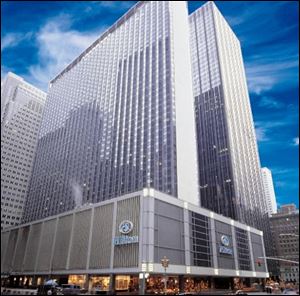
Hilton eyes growth as speculation grows about IPO
1/23/2012
Blackstone Group took Hilton Worldwide private in 2007. The company has more than 3,800 hotels in 88 countries.
When private-equity giant Blackstone Group took Hilton Worldwide private in a $26 billion buyout in 2007, the timing could not have been worse. It wasn’t long before a financial crisis consumed the global economy, and business travel — the bread and butter of the hotel giant — fell sharply.
But Hilton chief executive Chris Nassetta, in an interview with Washington Post reporters and editors, said the downturn had a silver lining: it gave the company time to restructure operations and breathe fresh life into its brands.
That work is beginning to pay off, prompting speculation on Wall Street that Hilton may be looking toward an initial public offering, but the company is in “no rush to go public,” Nassetta said.
“It will be taken into consideration at some point because private-equity firms eventually recycle investments,” he said. “But given significant value creation opportunities that still exist, there is no need right now.”
For now, Hilton is focused on staying the course of its growth strategy. The company, which has more than 3,800 hotels across 10 brands in 88 countries, has 150,000 more rooms in the pipeline around the world. Hilton now boasts 10 percent U.S. market share, the largest slice of the pie, according to Smith Travel Research.
“We’ve always been profitable, but we nearly hit our peak EBITDA (earnings before interest, taxes, depreciation and amortization) last year,” said Nassetta, who would not disclose exact figures for the private company.
Going private allowed Hilton to restructure its management team and undertake new initiatives without scrutiny from Wall Street, he said.
In the wake of the deal, Hilton launched Home 2 Suites, an extended-stay brand targeting budget-conscious leisure travelers. The company revamped its food and beverage offerings, creating a database of options for its owners.
Many analysts balked at the $26 billion Hilton purchase, one of the largest private equity deals on record. Blackstone was saddled with $20 billion in debt from the deal, even if the long-term maturity dates did not pose an immediate threat.
In February 2010, the private equity firm reached a deal with Hilton’s lenders to reduce the company’s debt load by roughly $4 billion. As the year progressed, demand for hotels rebounded, fueling rate increases and revenue growth.
All told, Blackstone has injected more than $6 billion in equity into the company.
Nassetta, who relocated Hilton’s headquarters to suburban McLean, Va., from Beverly Hills, Calif., believes this year will usher in more opportunities to expand. In Europe, the company hopes to convert independent hotels into Hilton brands, as hotel owners seek out the security of being backed by a major hospitality firm amid the economic turmoil there. Asia, he said, continues to offer a wealth of opportunities to grow both limited-service and luxury brands, like Conrad.
The company’s core strategy will be to manage operations for hotel owners as opposed to buying hotels and operating them itself, because the economies of scale are more lucrative, he said.
“People thought Blackstone paid a high multiple, but what they didn’t realize was that Hilton was sub-optimized,” Nassetta said. “Since Blackstone bought the company, we have grown the system by nearly 30 percent, the fastest growth rate of the major hospitality companies.”